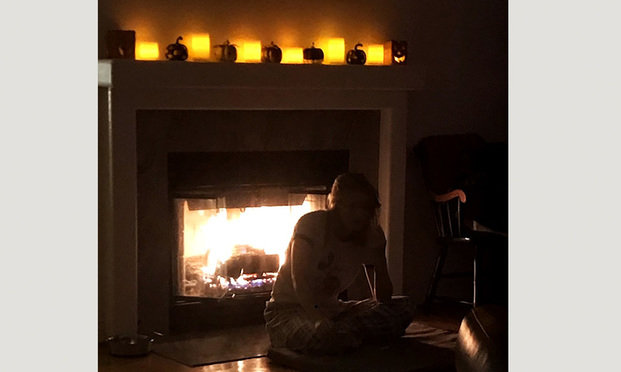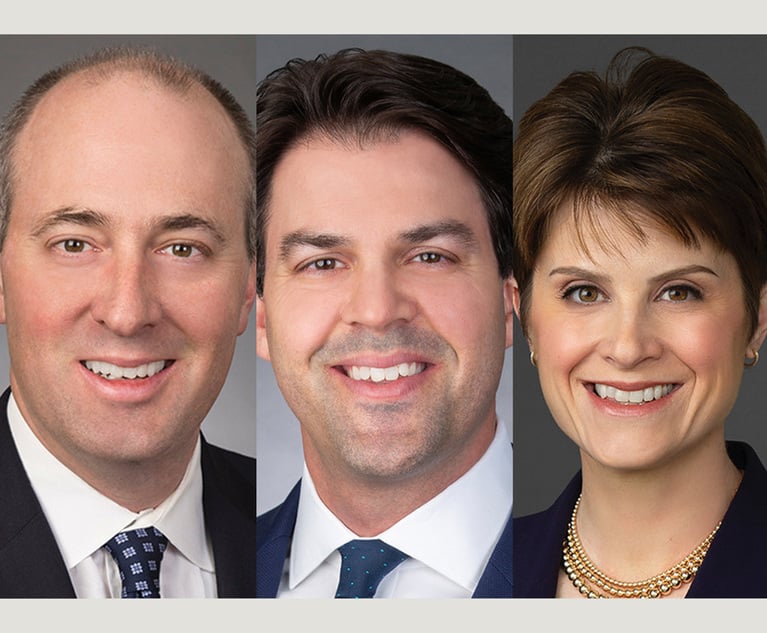Daily Dicta: Yes, PG&E Sucks—But Can You Sue Them?
While I admit no electricity is preferable to catastrophic wildfires that kill dozens of people and destroy billions of dollars in property, surely the choice shouldn't be either/or.
October 30, 2019 at 01:00 AM
5 minute read
 This is how petty I've become: When I heard on Monday night that some people not too far away from me got their power restored by Pacific Gas & Electric I wasn't happy for them. I was just bitterly jealous—our power has been out continuously since Saturday. (That's my daughter above, hanging out at home in the dark.)
This is how petty I've become: When I heard on Monday night that some people not too far away from me got their power restored by Pacific Gas & Electric I wasn't happy for them. I was just bitterly jealous—our power has been out continuously since Saturday. (That's my daughter above, hanging out at home in the dark.)
I consoled myself by remembering my Marin County, California neighbors would probably have electricity for less than 24 hours. It's supposed to be windy again today (by "windy," we're talking 10 – 15 mph during the day, and 2 mph tonight, per my weather app) and PG&E scheduled yet another "public safety power shutoff."
When will we get power back? Who knows? PG&E isn't saying.
While I admit no electricity is preferable to catastrophic wildfires that kill dozens of people and destroy billions of dollars in property, surely the choice shouldn't be either/or.
 On my town's listserv and Facebook group, there have been repeated calls along the lines of "We should all sue the bastards."
On my town's listserv and Facebook group, there have been repeated calls along the lines of "We should all sue the bastards."
Twitter is equally full of indignant customers clamoring for litigation. "When someone starts a class action lawsuit against PG&E let me know. My business has been royally screwed by the unnecessary and without notice outages in my area," wrote one person. "Where's Erin Brockovich when you need her?! Pg&e needs another class action lawsuit," wrote another.
All I can say is, good luck—and get in line.
The utility, which filed for Chapter 11 bankruptcy protection in January, has been hit in recent days with multiple shareholder class actions. Pomerantz, for example, sued PG&E in U.S. District Court for the Northern District of California on Oct. 25.
The complaint claims that the utility made materially false and misleading statements about its "purportedly enhanced wildfire prevention and safety protocols and procedures," which turned out to be "inadequate to meet the challenges for which they were ostensibly designed."
PG&E stock started the year trading at $23.80 and is now around $5 a share.
In September, the utility—represented by Cravath, Swaine & Moore—reached an $11 billion deal to resolve claims by insurance companies for losses from fires in 2017 and 2018. The settlement follows an agreement in June to compensate local governments $1 billion for fire-related damages such as loss of natural resources, loss of public parks and fire suppression costs.
PG&E still faces about 70,000 claims from individual fire victims—people who lost their homes, cars or other possessions, or suffered physical injuries or emotional distress. On Monday, PG&E agreed to extend the deadline for filing such claims until December 20.
Moreover, PG&E is slated for an eight-week trial in San Francisco Superior Court in January. (How'd you like to pick that jury?)
The utility is being sued by victims of the 2017 Tubbs fire, which destroyed more than 4,600 homes and killed 22 people in Sonoma and Napa counties.
State investigators determined—for once—that the fire was not PG&E's fault, concluding it was started by a private property owner's electrical system. But U.S. Bankruptcy Judge Dennis Montali in August ruled that a jury should decide if PG&E was in fact culpable. If so, that could add billions more to PG&E's legal tab.
Oh also, the 75,000-plus acre Kincade fire currently burning in Sonoma County? Even though PG&E had cut power by de-energizing its distribution lines, its transmission lines reportedly still had juice—and may have ignited the blaze.
So what about the 2 million of us PG&E deliberately left in the dark? Do we have claims for the spoiled food in our freezers?
By law, PG&E is allowed to shut off electric power to protect public safety under California Public Utilities Code Sections 451 and 399.2(a). And in May, California's Public Utilities Commission approved PG&E's wildfire mitigation plan, which specified shutting down the power when fire danger is high.
This does not strike me as providing the makings of a winning consumer class action.
Asking PG&E directly for compensation is also not likely to succeed.
Last fall, when PG&E did its first-ever power safety shutoff (which was much shorter and smaller in scope) it got 146 claims from customers, mostly for food loss and business interruption. It rejected them all, the San Francisco Chronicle reported.
"We do not reimburse customers for losses, as power will be shut off for safety when gusty winds and dry conditions, combined with a heightened fire risk, threaten a portion of the electric system," said spokeswoman Mayra Tostado.
Which leaves small claims court—and perhaps the only judgments PG&E can afford to pa
This content has been archived. It is available through our partners, LexisNexis® and Bloomberg Law.
To view this content, please continue to their sites.
Not a Lexis Subscriber?
Subscribe Now
Not a Bloomberg Law Subscriber?
Subscribe Now
NOT FOR REPRINT
© 2025 ALM Global, LLC, All Rights Reserved. Request academic re-use from www.copyright.com. All other uses, submit a request to [email protected]. For more information visit Asset & Logo Licensing.
You Might Like
View All
Litigators of the Week: A $604.9M Trade Secrets Verdict With a Big Assist From a Juror Question

Litigators of the Week: A Reset in the Fight Over Nearly $2B in Bonds Issued by Venezuela's National Oil Company

How Kirkland & Ellis Litigators Became a National Brand in Oil and Gas

Dorsey & Whitney Hits Back Against Complaint Claiming Firm Dragged Its Feet on Malpractice Suit Against Fellow Big Firm
Trending Stories
- 1Munger, Gibson Dunn Billed $63 Million to Snap in 2024
- 2January Petitions Press High Court on Guns, Birth Certificate Sex Classifications
- 3'A Waste of Your Time': Practice Tips From Judges in the Oakland Federal Courthouse
- 4Judge Extends Tom Girardi's Time in Prison Medical Facility to Feb. 20
- 5Supreme Court Denies Trump's Request to Pause Pending Environmental Cases
Who Got The Work
J. Brugh Lower of Gibbons has entered an appearance for industrial equipment supplier Devco Corporation in a pending trademark infringement lawsuit. The suit, accusing the defendant of selling knock-off Graco products, was filed Dec. 18 in New Jersey District Court by Rivkin Radler on behalf of Graco Inc. and Graco Minnesota. The case, assigned to U.S. District Judge Zahid N. Quraishi, is 3:24-cv-11294, Graco Inc. et al v. Devco Corporation.
Who Got The Work
Rebecca Maller-Stein and Kent A. Yalowitz of Arnold & Porter Kaye Scholer have entered their appearances for Hanaco Venture Capital and its executives, Lior Prosor and David Frankel, in a pending securities lawsuit. The action, filed on Dec. 24 in New York Southern District Court by Zell, Aron & Co. on behalf of Goldeneye Advisors, accuses the defendants of negligently and fraudulently managing the plaintiff's $1 million investment. The case, assigned to U.S. District Judge Vernon S. Broderick, is 1:24-cv-09918, Goldeneye Advisors, LLC v. Hanaco Venture Capital, Ltd. et al.
Who Got The Work
Attorneys from A&O Shearman has stepped in as defense counsel for Toronto-Dominion Bank and other defendants in a pending securities class action. The suit, filed Dec. 11 in New York Southern District Court by Bleichmar Fonti & Auld, accuses the defendants of concealing the bank's 'pervasive' deficiencies in regards to its compliance with the Bank Secrecy Act and the quality of its anti-money laundering controls. The case, assigned to U.S. District Judge Arun Subramanian, is 1:24-cv-09445, Gonzalez v. The Toronto-Dominion Bank et al.
Who Got The Work
Crown Castle International, a Pennsylvania company providing shared communications infrastructure, has turned to Luke D. Wolf of Gordon Rees Scully Mansukhani to fend off a pending breach-of-contract lawsuit. The court action, filed Nov. 25 in Michigan Eastern District Court by Hooper Hathaway PC on behalf of The Town Residences LLC, accuses Crown Castle of failing to transfer approximately $30,000 in utility payments from T-Mobile in breach of a roof-top lease and assignment agreement. The case, assigned to U.S. District Judge Susan K. Declercq, is 2:24-cv-13131, The Town Residences LLC v. T-Mobile US, Inc. et al.
Who Got The Work
Wilfred P. Coronato and Daniel M. Schwartz of McCarter & English have stepped in as defense counsel to Electrolux Home Products Inc. in a pending product liability lawsuit. The court action, filed Nov. 26 in New York Eastern District Court by Poulos Lopiccolo PC and Nagel Rice LLP on behalf of David Stern, alleges that the defendant's refrigerators’ drawers and shelving repeatedly break and fall apart within months after purchase. The case, assigned to U.S. District Judge Joan M. Azrack, is 2:24-cv-08204, Stern v. Electrolux Home Products, Inc.
Featured Firms
Law Offices of Gary Martin Hays & Associates, P.C.
(470) 294-1674
Law Offices of Mark E. Salomone
(857) 444-6468
Smith & Hassler
(713) 739-1250






